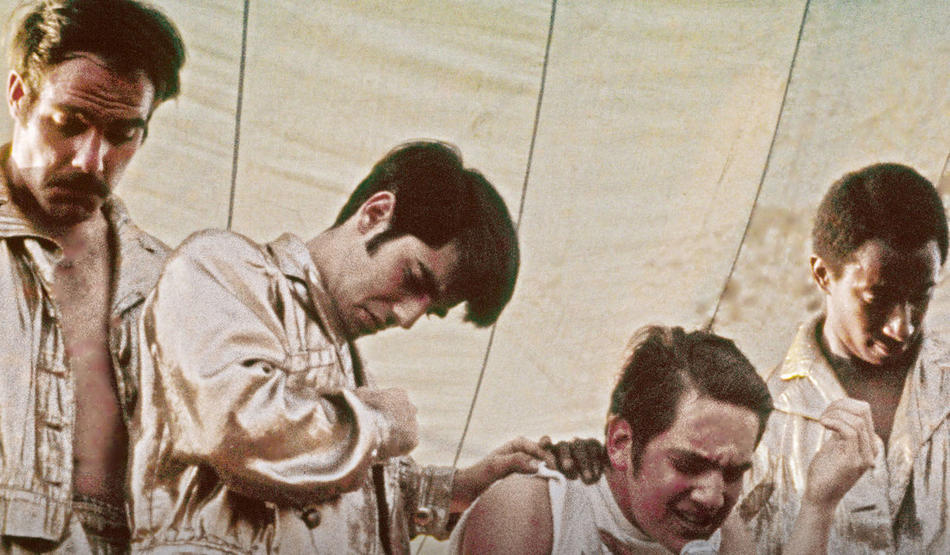For Alan Cooper ’71CC, the town of Bethel, New York, must have lived up to the meaning of its name on August 18, 1969. On that day, Cooper and 11 other young men, all Columbia undergrads except for one, took the stage at the Woodstock Music and Art Fair before what was left of a crowd of half a million — a “House of God” for the Aquarian age.
The concert was supposed to have ended the previous evening with a midnight performance by Jimi Hendrix, but rain and technical glitches had pushed the climax to the morning. Now, with Hendrix standing by to play “The Star Spangled Banner,” Cooper’s band, called Sha Na Na — a doo-wop revival act, an anachronism, more grease than peace — made its entrance.
In the 1970 concert documentary Woodstock, the group, with Cooper on lead vocals, is shown performing “At the Hop” by Danny and the Juniors. From a 40-year vantage, Sha Na Na, with its gold lamé outfits and Busby Berkeley choreography, its speeded-up rockabilly and riotous twisting and strutting, seems to anticipate punk rock as much as it recast the 1950s. In any case, no one would confuse Cooper, dressed in a hunting vest, a taxi driver’s cap, sunglasses, rolled-up pants, and bright red socks, with Carlos Santana. (At 19, Cooper was the same age as Santana’s drummer, Michael Shrieve, who is credited with being the youngest performer at the festival.)
Just three months earlier, Sha Na Na was still the Columbia Kingsmen, the traditional Columbia singing group. Scheduled to play the Lion’s Den at Ferris Booth Hall, the group filled out its program of original tunes with a grab bag of ’50s covers. The covers were a hit. George Leonard ’67CC, ’72GSAS, brother of Kingsman Rob Leonard ’70CC, ’82GSAS, then suggested adding costumes and dancing. The next Lion’s Den gig was packed. “People were jumping around like it was a Beatles concert,” Cooper recalls. For the Columbia administration, 1958 was the perfect antidote to 1968. “They saw it as a pressure release,” Cooper says. “They were happy to let us do our thing — it was fun, it wasn’t political, and people enjoyed themselves."
The guys searched for gigs off campus. They drove to clubs all over the city, armed with reviews from Spectator and fliers they’d posted for a campus show. No one was buying. The last place they tried was Steve Paul’s Scene at 8th Avenue and 46th Street. After a red-hot audition, they got a regular gig after hours, and that summer, says Cooper, “We became the ‘in’ act among the theater culture. All the actors would come to check us out.” In a bit of foreshadowing, Jimi Hendrix came by — twice. “The first time he was besieged by fans. The second time he came in a floppy hat and glasses. He absolutely loved the act. As a musician, there was no one we admired more.” Little did Cooper know that the guitar god and the kids from Columbia would meet again in Bethel, on the biggest stage in the world.
When that moment came on the gray morning of August 18, Cooper, a sophomore, looked out on the endless pasture of sodden hippies who were waiting for Hendrix. It was a long way from the Lion’s Den, but Cooper wasn’t nervous. “We were awake for three days, imbibing all the various substances,” he says. “There was no potable water, but there was plenty of champagne. ‘Nervous’ would probably be the last word I’d use.” The first word, then? “‘Blissed out’ would do it.”
Forty years later, Cooper is out of the music business, having turned his focus to higher realms. He earned a doctorate in religious studies from Yale, and is now the Elaine Ravich Professor of Jewish Studies at the Jewish Theological Seminary, where he is also provost. As a scholar, Cooper has written extensively on biblical poetics and the history of interpretation.
But what about singing? Does he ever get the urge to perform? Not really, though occasionally he sings at his synagogue in South Orange, New Jersey. It’s called Congregation Beth El.



